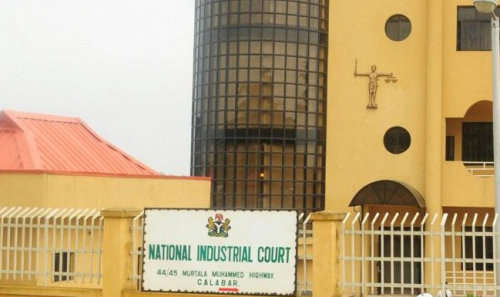COURTROOM NEWS 17/01/2024
Court orders LBIC to Pay Staffs N24m Outstanding Payment

Hon. Justice Salisu Danjidda sitting in the Lagos Judicial Division of the National Industrial Court has declared that the payments made by the Lagos Building Investment Company Plc to Olatunbosun Owolabi and 8 others upon the termination of their employment were under-calculated and ought to be calculated in accordance with the provisions on severance benefits contained in the Company’s Staff Handbook.
The Court ordered the Lagos Building Investment Company Plc to pay Olatunbosun Owolabi and 7 others jointly and severally, the sum of N24,045,936.85 (Twenty Four Million, Forty-Five Thousand, Nine Hundred and Thirty-Six Naira, Eighty-Five Kobo), being the aggregate of their outstanding payment.
Justice Danjidda further granted an order compelling the Lagos Building Investment Company to pay Folasade Taiwo the sum of N84,346.41 (Eighty-Four Thousand, Three Hundred and Forty-Six Naira, Forty-One Kobo), being the aggregate of her outstanding entitlement payment.
From facts, the Claimants- Olatunbosun Owolabi and 8 others had submitted that Lagos Building Investment Company Plc failed to compute their redundancy benefit using the Collective Bargaining Agreement and or the Company’s Handbook after being relieved of their jobs on the ground of reorganisation of the company.
In defence, the defendant- Lagos Building Investment Company Plc maintained that it was not under any obligation to honour the agreement brokered by the Association of Senior Staff of Banks, Insurance and Financial Institutions (ASSBIFI) on behalf of Olatunbosun Owolabi and 8 others but honoured the same on compassionate grounds. The Company averred that Owolabi and 8 others are not allowed to reverse their position two years after being paid their benefits the amount brokered by their representative, and urged the Court to dismiss the case in its entirety.
Counsel to the Lagos Building Investment Company submitted that the 2005 Collective Bargaining Agreement had expired in 2007, that Owolabi and 8 others and the company not being a party to it could not have, breathed a new lease of life into it by incorporating or referencing it into the terms of employment or the employee handbook.
In opposition, Learned counsel to Owolabi and 8 others submitted that by the combined reading of Termination letters, Statements of Account as well as the admission of the Defendant, and the clear evidence of his clients’ witnesses, the conclusion the Court will find is that his clients’ employments were terminated on the ground of Redundancy.
It is the submission of counsel that imports of what the Lagos Building Investment Company described as “strategic reorganization aimed at repositioning the bank for growth and profitability” cannot have a different meaning from what is meant by redundancy as specifically used by the company in other documents.
In a well-considered judgment, the presiding Judge, Justice Salisu Danjidda held that Lagos Building Investment Company Plc does not need to expressly state that Olatunbosun Owolabi and 8 others are “declared” redundant before a claim for redundancy benefits will arise.
The Court observed that Lagos Building Investment Company Plc in the exhibit tendered admitted to paying Owolabi and 8 others the full and final settlement of the redundancy benefits which was brokered by the Association of Senior Staff of Banks, Insurance and Financial Institution (ASSBIFI) and dully accepted by the staffs.
Justice Danjidda held that there is nothing like ex-gratia contained in the Owolabi and 8 others’ letters of employment or Lagos Building Investment Company’s handbook as contended by the firm that the payment made to them was an ex-gratia payment done in accordance with the terms of their agreement.
Justice Danjidda refused the claim for redundancy on the 2005 Collective Bargaining Agreement for the failure of Owolabi and 8 others to prove their membership of the union but found their entitlement to redundancy in accordance with the Company Handbook.
“Judgment is entered accordingly with a cost of N200,000 in favour of the Claimants against the Defendant.” The Court ruled.



